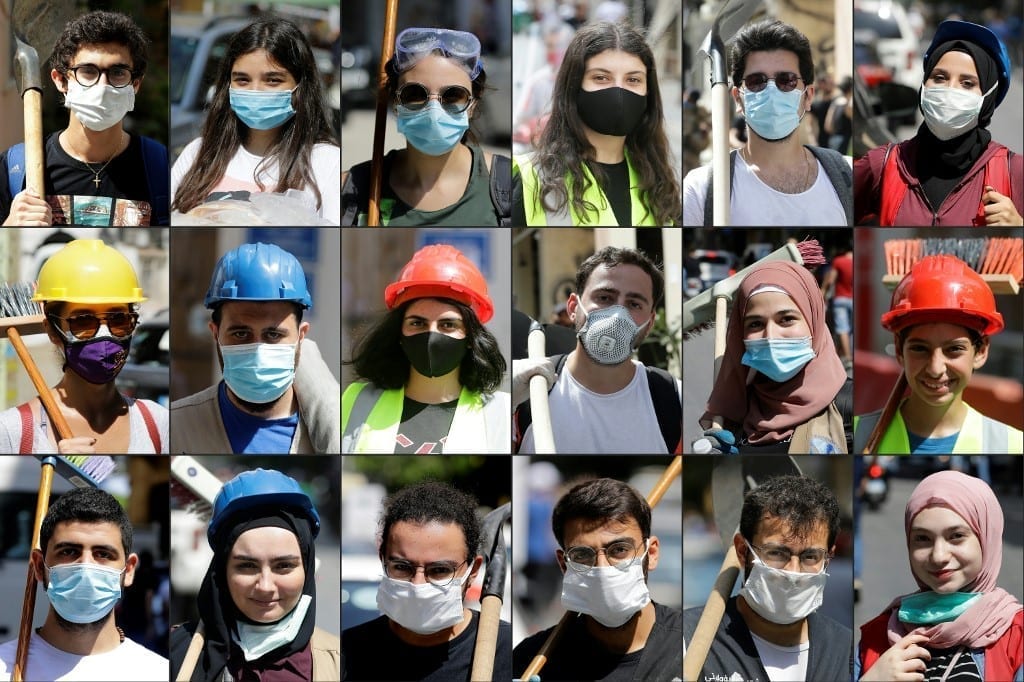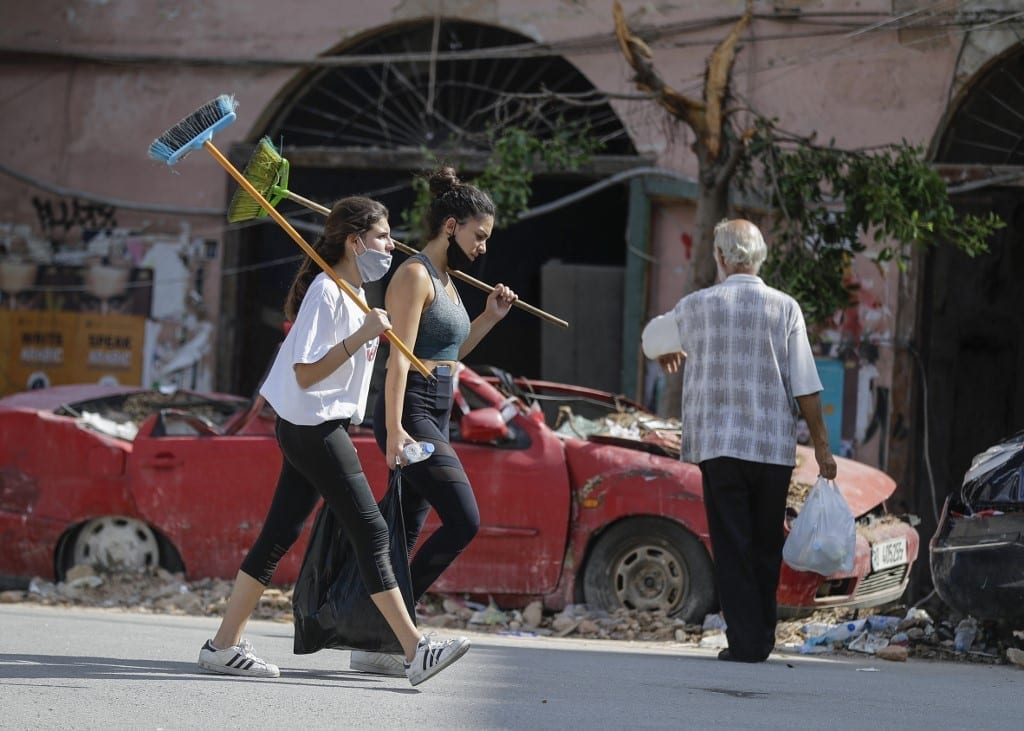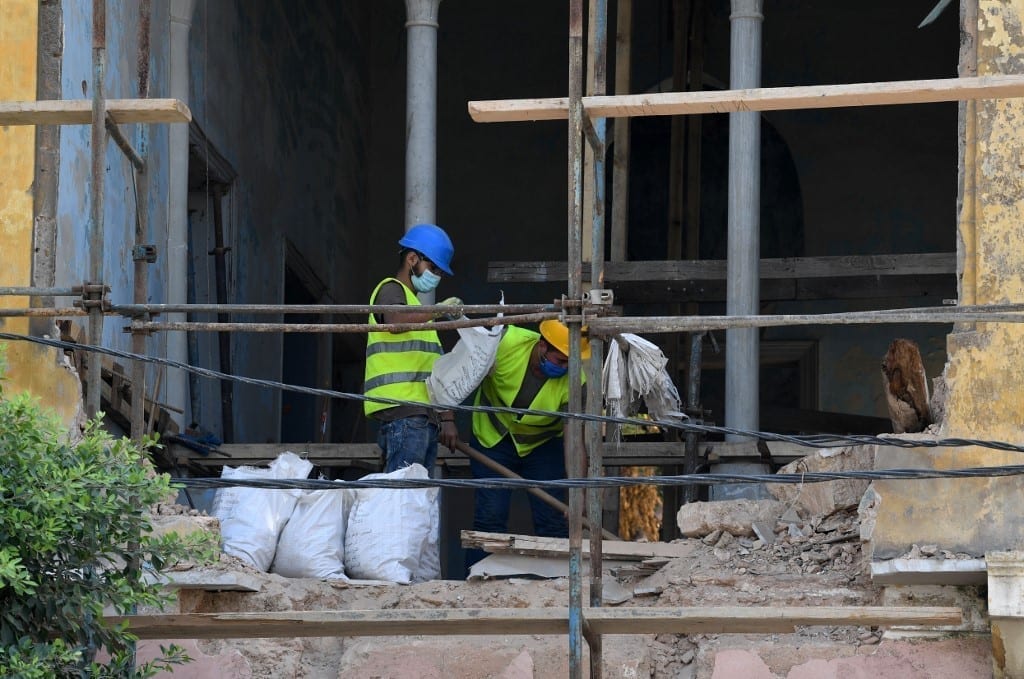“Either the second or the third day [after the Beirut Port explosion], we went to Karantina, we were the first people to get there. The red cross hadn’t even reached there yet at that point,” Nader Hosn, a 22-year old 4th-year film student, tells Daraj.
“At the end of the day there’s no way we can rely on the government, if on the third day no one else had gotten there except for us, then of course you have no hope for that.”
The “us” he mentioned were a group of young Lebanese men and women, much like himself, who eventually formed a team called ‘family to family’ that has been down there every day since the disaster ensued. With no professional training, and no volunteering or disaster/relief-related experience in the past, Hosn and the brave strangers with him, suddenly found themselves informally and urgently covering for the disturbing lack of qualified assistance given to those areas.
Who, if not for our youth, would pull bodies from underneath the rubble and lie awake at night, thinking about those still missing, as politicians scramble about, to not only protect the millions they’ve already stolen, but to also maintain the ability to keep robbing whenever they please?
“The worst thing, in terms of helping with, was the first two days when we pulled out seven bodies from under the rubble. It was in the part of Gemmayze that was immediately facing the port,” Nader recalls. When asked what he was thinking while doing this, he replied, “Nothing. You’re down there to help, so if there’s a task that needs to be done, you just do it. You’re not going to sit and question it. If you don’t do it, then what? You have no choice.”
Of course, there are mountains of expressions that can be poured over Hosn’s story; metaphors of valor, triumph and hope in the youth; and yet, the thought of a young film student, in his twenties, having to grit his teeth and work through his trauma, instead of being anywhere else, secure, protected, and healing, couldn’t be a more blatant and alarming sign, of a state in collapse. Our hearts, mine and many of those observing with me, fill with warmth, but also equally with rage and confusion.To be clear, in times of hardship, volunteering efforts and solidarity generally peak, and those who survived unscathed should assume that it is their duty to help, but was this scale standard?

“I wanted to be able to say that I helped rebuild Beirut, not just that I survived an explosion,” Sarah (not her real name), a fresh architect, uneasily justifies, a few weeks after the explosion. Although she lives outside of Beirut, she was at her office in Gemmayze the night the ammonium went ablaze, and only narrowly escaped the building she was in. Shards of glass cut into her left arm, tearing two of her tendons and cutting into her back, and like many of those wounded she spent the next few hours bleeding from one hospital to another.
A few weeks and a surgery later, she is aware that her injury will place a large dent on her work, as she was left handed, and is informed that she needs three to six months to regain control of her fingers. Still, she celebrates every time she can lift one a millimeter higher than the last time she tried, and like thousands like her expresses her thoughts to her friends and family in attempts to process what had happened to her. Watching her generation with brooms sweep up the streets on the news, she is conflicted.
“I wanted to help, especially because I’m sure there were a thousand people that were injured and they still went down to help,” she tells Daraj. “And they kept literally calling for architects, so I felt like they were almost singling me out, but there I was, sitting at home, avoiding watching the news.”
“I mean if it were some professionals doing it I don’t think I would’ve felt this way, but I kept seeing my friends or other common people I know, especially on the first week,” she continues. “Everyone was down there so I felt so much pressure, and this is coming from someone who could barely tie their hair.”


A Failed State
One doesn’t need to look for too long to find signs that Lebanon is now, and has been, a failed state. Suicide attempts in front of banks, migrant domestic workers asleep on the streets, and immigration endeavors at their all-time high. Of course, an explosion at the capital, at a minimum said to be a problem of negligence, that killed hundreds, misplaced thousands and broke the hearts of millions, could easily be resorted to in attempts to express the utter incompetence of those who hold power, against the will of the majority. Still, the aftermath of the event, held the youth of the country that were still alive in shackles, producing the ultimate proof, of Lebanon being a futile state.
At the very minimum, images that are usually conjured in the aftermath of any kind of disaster in a functional state, is one of trained professionals, spilling onto the scene only hours after it’s ensuing, picking up the pieces, providing support, scaling the chaos; helicopters, ships, trucks, and brave suits busily and professionally hustling on television screens, while those who have been affected watch, cry and take their moments to heal.
Needless to say, that was far from what happened in Beirut. The bitter added layer in the devastating Beirut Port Explosion, was the massive helplessness and the utter scale of indifference, incompetence, and lack of professional assistance on part of those in charge. The result of those things, was the giant burden not placed, but now hurled onto Lebanon youth’s shoulders; this was no normal survivor’s guilt; this guilt grips you, and screams the atrocious truth in your ears when you try to disconnect: “If you don’t help, no one will.”


An Enormous Void
In the aftermath of a freak event or a natural disaster, it is normal for guilt, pain and fear to be a part of the equation for those who witnessed it, but the absence of reliable formal state institutions to provide urgent support adds to the pile a giant burden on the backs of the youth in the city. The supportive void is so large, in the midst of an also gigantic Pandora’s box of ailments in the country, that the need for their informal manpower becomes incredibly urgent; this kind of pressure obstructs any attempts at moving forward, and leaves one spliced into millions of pieces, not knowing where to offer oneself, and feeling guilty about where they haven’t. Yet, even being aware of this mentally disturbing dilemma doesn’t provide any reassurance; because in truth, if not for the youth, even if it wasn’t their burden to carry, where would we be today?
Who, if not the youth, should turn their attention to the Syrians in Karantina when the state blatantly doesn’t account for them? Who, if not our youth, should the Kenyans’ voices on the streets reach, as the army personnel hovering around them laugh and call them bitches? Who, if not for our youth, would pull bodies from underneath the rubble and lie awake at night thinking about those still missing, as politicians scramble about, to not only protect the millions they’ve already stolen, but to also maintain the ability to keep stealing whenever they please?
Where would we be if not for the youth, who’s youth was stolen from them forever?






